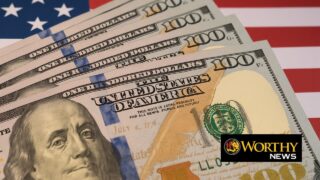
by Emmitt Barry, with reporting from Washington D.C. Bureau Staff
WASHINGTON (Worthy News) – Bank of America’s closure of accounts belonging to a Tennessee church elder and missionary has become a flashpoint in a national fight over alleged “debanking” of Christians and conservatives, the Wall Street Journal (WSJ) reported in an exclusive investigation.
Steve Happ, an elder at the Servants of Christ Church in Memphis, told the Journal he was preparing for a mission trip to Uganda in 2023 when he learned the bank was canceling three accounts linked to his ministry, orphanage support charity, and small business—together holding more than $270,000.
Letters from the bank informed Happ that he was “operating in a business type we have chosen not to service.” When he sought answers at his local branch, Happ said the longtime manager “just quoted that very same line from the letters” and offered no further explanation.
Happ concluded the closures reflected bias against Christian organizations. “That’s when I realized they didn’t want to work with Christian groups,” he said.
Bank of America’s Defense
Bank of America disputed that claim, telling WSJ that Happ’s accounts were closed “solely because they operated a business outside the U.S. and provided debt collection services,” which violated company policy. Spokesman Bill Halldin said the bank “never closes accounts for political reasons and doesn’t have a political litmus test.”
According to the report, the bank said Happ was given 30 days to move his funds and he successfully transferred the money elsewhere.
From Memphis to Washington
The WSJ noted that Happ’s case was amplified by Alliance Defending Freedom (ADF), a conservative Christian legal group that brought his story before Congress. ADF argued that his ordeal fit into a wider pattern of discrimination against conservatives and religious groups in corporate America.
President Donald Trump, who has claimed that JPMorgan Chase and Capital One closed his family’s accounts after the January 6, 2021, riots, embraced the issue. In August, he signed an executive order directing regulators to investigate banks accused of cutting off customers over political or religious beliefs, WSJ reported.
A White House spokesman told the paper the order requires banking decisions to be based on “individualized, objective, and risk-based analyses—not ideology or politics.”
Wider Banking Controversy
The WSJ highlighted how U.S. banks have, in recent years, distanced themselves from certain industries such as coal mining, assault-weapons manufacturing, and private prisons, citing environmental, social, and governance (ESG) concerns. Republicans accuse banks of allowing politics to drive lending and account policies.
House Judiciary Chair Rep. Jim Jordan (R-Ohio) has led hearings into the matter, citing whistleblower testimony that Bank of America voluntarily shared transaction data with the FBI after Jan. 6. The bank told the Journal it had acted lawfully at the request of law enforcement to protect Biden’s inauguration.
Laws and Fallout
According to the WSJ, Happ’s case has already inspired legislation in at least 11 states to penalize banks that close accounts for political or religious reasons, with Tennessee and Idaho enacting such laws.
While Happ said he eventually moved on, the episode left scars: “We were helping orphans eat and employees keep their jobs. Instead, I had to dip into my savings. I just don’t want this to happen to anyone else.”
Financial executives told the WSJ they fear Trump’s crackdown could turn banks into utilities unable to manage risk, warning of “witch trials” over account closures.
For now, the debate over “debanking”—brought to light in the Wall Street Journal report—continues to pit Wall Street’s biggest lenders against conservatives who say banks are shutting them out of the financial system.
Copyright 1999-2025 Worthy News. This article was originally published on Worthy News and was reproduced with permission.
Latest News from Worthy News
France was gripped by a second wave of nationwide strikes on Thursday, as hundreds of thousands marched against austerity measures and looming budget cuts—unrest that not only deepens the political crisis for President Emmanuel Macron and his new prime minister, Sébastien Lecornu, but also unfolds in a season many prophecy watchers view as charged with significance.
The Israel Defense Forces (IDF) launched a broad wave of strikes Thursday evening against Hezbollah military sites in southern Lebanon, escalating its campaign against the Iranian-backed terror group’s Radwan Force.
Three Israeli divisions continued a steady push into Gaza City on Thursday, the third day of Operation Gideon’s Chariots II, as the Israel Defense Forces (IDF) seek to seize Hamas’ last stronghold in the enclave.
FBI Director Kash Patel told lawmakers Wednesday that while the U.S. southern border has been largely sealed, the threat of terrorist infiltration has shifted northward, with a sharp rise in encounters along the Canadian frontier.
Bank of America’s closure of accounts belonging to a Tennessee church elder and missionary has become a flashpoint in a national fight over alleged “debanking” of Christians and conservatives, the Wall Street Journal (WSJ) reported in an exclusive investigation.
President Donald Trump said Thursday that the United States is actively working to regain control of Afghanistan’s Bagram Airfield, a strategic military installation abandoned during the 2021 withdrawal, calling it “a little breaking news.”
President Donald Trump announced Wednesday evening that he is designating Antifa as a “major terrorist organization,” citing a wave of violent protests and last week’s assassination of conservative activist Charlie Kirk.







